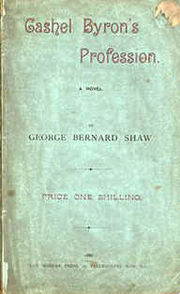
Cashel Byron's Profession
Encyclopedia

George Bernard Shaw
George Bernard Shaw was an Irish playwright and a co-founder of the London School of Economics. Although his first profitable writing was music and literary criticism, in which capacity he wrote many highly articulate pieces of journalism, his main talent was for drama, and he wrote more than 60...
fourth novel. The novel was written in 1882 and after rejection by several publishers it was published in serialized form in a socialist
Socialism
Socialism is an economic system characterized by social ownership of the means of production and cooperative management of the economy; or a political philosophy advocating such a system. "Social ownership" may refer to any one of, or a combination of, the following: cooperative enterprises,...
magazine. The novel was later published as a book in England and the United States. Shaw wrote five novels early in his career and then abandoned them to pursue politics, drama criticism and eventually play writing. The Admirable Bashville (1901), a short play based loosely on this novel, was written to protect American copyrights after the novel became unexpectedly successful in the United States.
Preface
In Shaw's preface "Novels of my Nonage", written in 1901, he disparages his early work, including Cashel Byron's Profession: "...people will admire [the author] for the feats any fool can achieve, and bear malice against him for boring them with better work." He also resurrects a heavily edited Robert Louis Stevenson quote used to promote the book. The full text of the quote breaks down the story into parts, including one part “blooming gaseous folly”.Novel
The novel follows Cashel Byron, a world champion prizefighter, as he tries to woo wealthy aristocrat Lydia Carew without revealing his illegal profession.Lydia is portrayed as a moral and intelligent woman (although "priggish" according to Shaw) and is constantly contrasted with the "ruffian" Cashel. Lydia was advised by her recently deceased father to find a husband with a profession, as opposed to an idle gentleman or an art critic like her father.
Cashel’s childhood ends when he runs away from school to Australia and becomes apprentice to an ex-world champion boxer. When Cashel goes to England to secure his world title in that country he meets Lydia at her country manor. After much miscommunication and drawing room comedy, Cashel gives up boxing and succeeds in marrying Lydia. As in his postscript to "Pygmalion"
Pygmalion (play)
Pygmalion: A Romance in Five Acts is a play by Irish playwright George Bernard Shaw. Professor of phonetics Henry Higgins makes a bet that he can train a bedraggled Cockney flower girl, Eliza Doolittle, to pass for a duchess at an ambassador's garden party by teaching her to assume a veneer of...
(1912), in which he describes Eliza Doolittle's future life, Shaw chose to portray the Byron marriage in a realistic manner and narrates how Lydia comes to regard Cashel as "one of the children".
Postscript
According to "Note on Modern Prizefighting" (1901) Shaw intended the fightsLondon Prize Ring rules
The London Prize Ring Rules was a list of boxing rules promulgated in 1838 and revised in 1853. These rules were based on those drafted by Britain's Jack Broughton in 1743 and governed the conduct of prizefighting/bare-knuckle boxing for over 100 years...
described in Cashel Byron's Profession to turn the public away from the sport but the novel is written in such a light-hearted tone this unlikely result never materialized.

